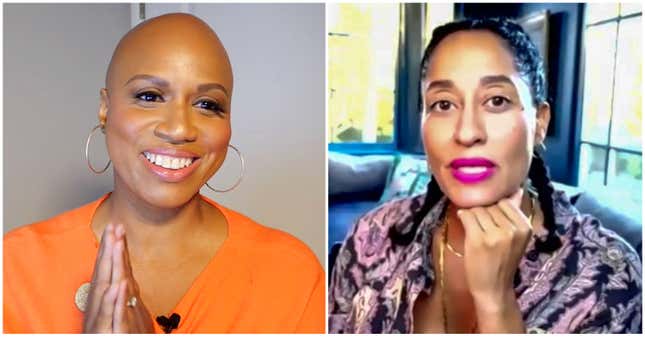
Can you believe it’s nearly the end of 2020—and amid everything else, in most states in America we’re still asking for permission to wear our hair as we please? While the freedom to wear naturally textured or traditional Black hairstyles may seem purely aesthetic to the willfully ignorant some, it is in fact part of the larger spectrum of human rights issues resulting from race-based discrimination; which is why, in 2019, the CROWN Act (“Create a Respectful and Open World for Natural Hair,”) was proposed to outlaw hair discrimination once and for all, as explained in a press release from civil rights advocacy organization Color Of Change:
In collaboration with Dove, National Urban League, and Western Center on Law and Poverty — Color Of Change, Congresswoman Ayanna Pressley. Rep. Leslie Herod, Senator Cory Booker, and other elected officials have pushed for the passage of The CROWN Act—a crucial and necessary step toward full protection for Black people throughout the country from hairstyle discrimination in schools and workplaces, and its residual effects.
After passing in seven states, including California, New York, New Jersey and Virginia, the bill passed the U.S. House of Representatives in September, and now awaits consideration and hopeful passage by the Senate.
“Every Black person has a story of racial discrimination, and hair discrimination has been a part of our experience as Black people for far too long,” notes Rep Ayanna Pressley (D-Mass.), a co-sponsor of the CROWN Act. “It’s not just about the impact on self-esteem or how it undermines ethnic pride; hair discrimination can affect Black people’s ability to learn and, as a consequence, our economic status. The CROWN Act would codify nondiscrimination protections so that employers cannot discriminate based on ethnic hairstyles — and it will help liberate us to show up as our most authentic selves. The CROWN Act is civil rights legislation that grants us our rightful self-hood.”
“Black hair has been at the center of economic, political, and cultural revolutions,” adds actor, producer, and CEO of Pattern Tracee Ellis Ross. “We think of maps to freedom hidden in our braids; Angela Davis and her afro as a symbol of pride and resistance; Frederick Douglass’ hair as an expression of prosperity and perseverance against all odds. Hairstyle discrimination is an economic issue and a civil rights issue. Grooming policies are arbitrarily enforced, and prevent access to academic and economic opportunities for the Black community. The CROWN Act is an essential policy, safeguarding the existence, dignity, and humanity of Black people.”
The safety and existence of Black businesses—many of which are small beauty businesses—are also in jeopardy due to the financial effects of the COVID crisis. With that in mind, Ellis Ross has joined Reps. Pressley and Leslie Herod (D-Colo.), Color Of Change Vice President Arisha Hatch, and small Black beauty business owners Jennifer Lord (Natural Hollywood, LLC) and Thomasina Jackson (New Image Hair Salon) for InHAIRitance: Supporting Hair Love & Small Black Beauty Businesses, “a critical conversation on combating hair discrimination, the state of Black beauty businesses during the COVID-19 pandemic, and how to further support Black-owned small businesses,” produced by Color Of Change.
“Black beauty salons are essential,’’ Hatch explained of these compounded threats to Black image autonomy. “In a world where Black people’s bodies are constantly policed and politicized, Black-owned hair salons enable our agency, autonomy, and self-expression. Black businesses are the cultural and economic engines of our communities, yet they have been drastically unsupported and under-resourced through inequitable COVID relief measures. Color Of Change will continue to demand immediate government support of small Black businesses and Black workers during the pandemic—and beyond—while challenging the written and unwritten rules to pass laws that protect Black people.”
The event coincides with the release of Color Of Change’s Black Business Green Book, “a new digital directory that helps consumers locate Black-owned small businesses across the country to patronize during the holiday season and beyond,” according to a separate release, which notes that users can search the ever-expanding online directory by state and across a range of product categories (anyone can submit business Information on an ongoing basis).
“As the pandemic continues to decimate Black-owned businesses at a disproportionate rate, the need to support them is more urgent than ever,” the release adds, giving further context to the challenges facing Black business owners, as, without additional federal relief, more than half may be forced to close by April 2021.
The COVID-19 pandemic has decimated small businesses throughout these past several months, and Black business owners are bearing the brunt of this economic crisis due to inequitable federal support. A recent poll by Color Of Change and Main Street Alliance indicates that only 37% of Black small business owners received the amount of assistance they requested, despite being more likely to apply. Findings also show that nearly half of Black-owned small businesses—46%—have already closed permanently or will soon shutter due to insufficient federal COVID relief. The poll emphasizes what many Black business owners like Jennifer Lord and Thomasina Jackson already know: they need relief, and they need it now.
“We must do all that we can to help Black-owned small businesses—the economic engines and cultural hubs of our communities—as the devastating effects of COVID-19 and the lack of adequate federal aid continue to threaten their survival,” urges Jade Magnus Ogunnaike, senior campaigns director at Color Of Change. “While our Black Business Green Book is a direct way to support Black business owners this holiday season, we know consumers alone cannot provide the level of economic relief Black businesses need to stay afloat. They need quick and decisive action from Congress, and Color Of Change will continue to leverage our millions of members to ensure that Black businesses get the financial support they need to keep their doors open.”
To hear more from Ellis Ross, Reps. Pressley and Herod, and most importantly, business owners themselves, you can tune into InHAIRitance now—For the CROWN Act, for the community, and yes, for the culture.

